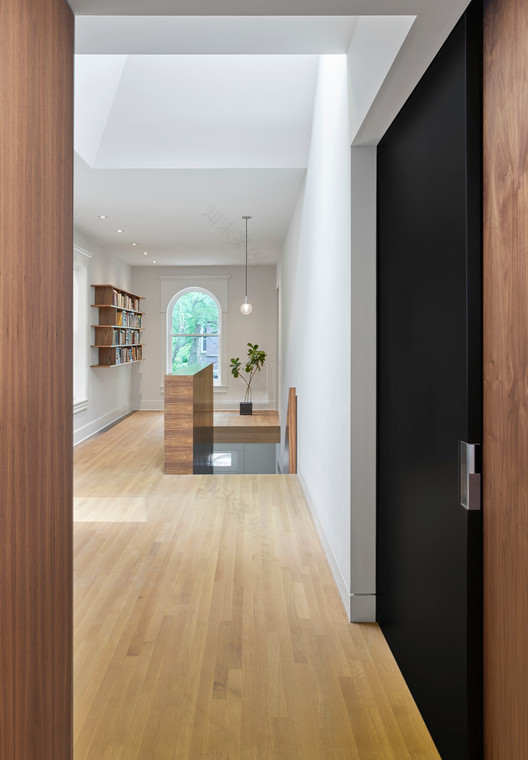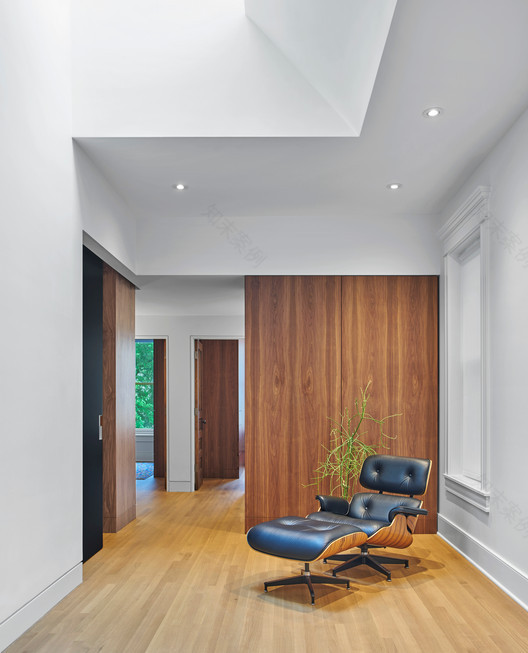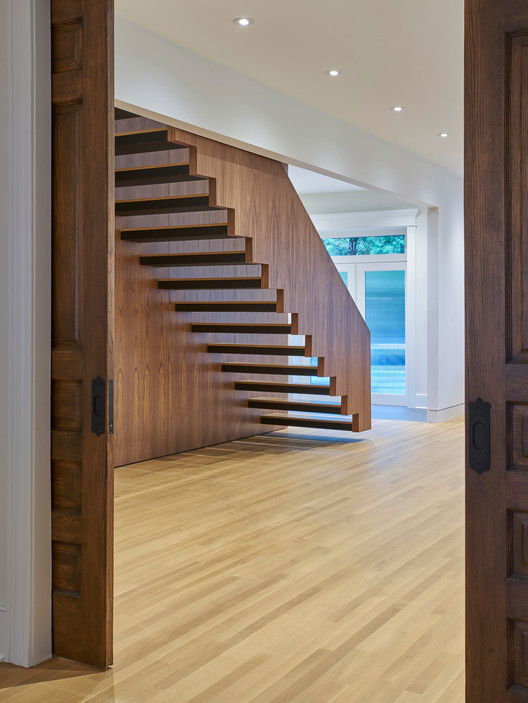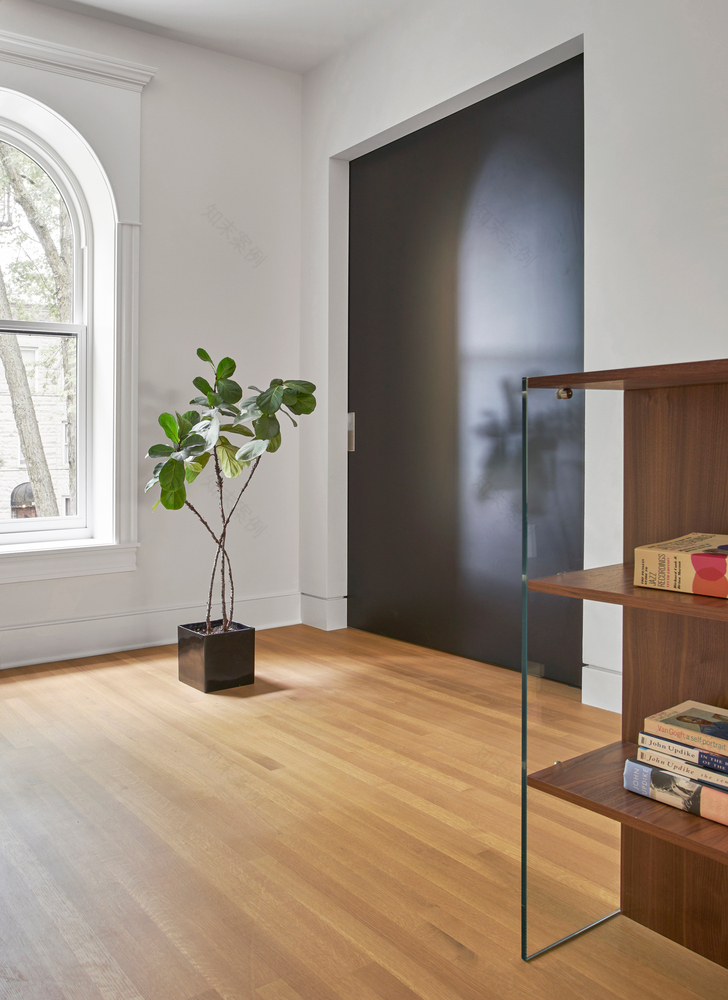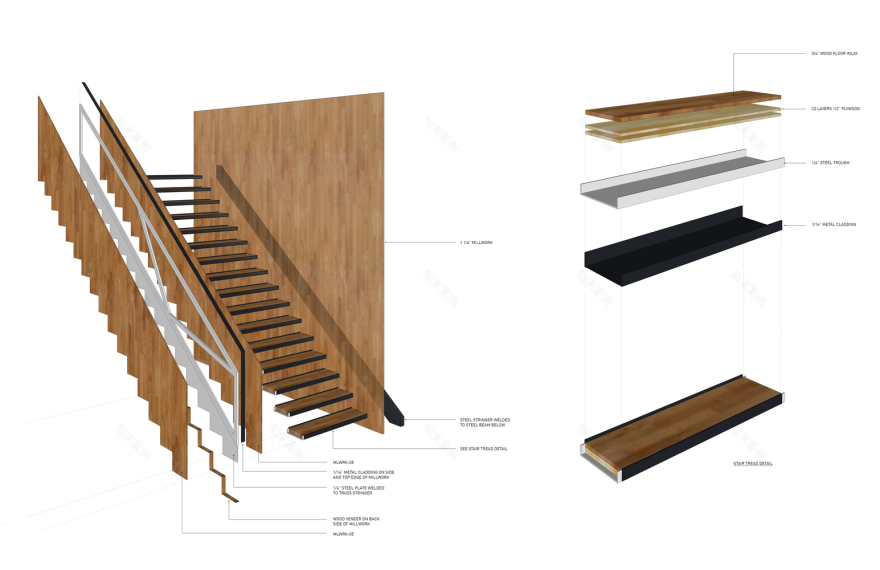查看完整案例


收藏

下载
© Mike Schwartz
迈克·施瓦茨
架构师提供的文本描述。我们的任务是将这座百年老旧、破旧的芝加哥两套公寓改造成一个单一的家庭住宅,这让我们有机会回答一个问题:如何在将新生命注入现有的废弃外壳的同时,保留和整合昨天和今天的无形建筑品质?我们处理这个问题的方法是观察现有的物质和空间的“沉重”,考虑到克制和观赏性的过度并存,探索开放的特性和分隔化,并将旧工艺与新的传统叠加起来。
Text description provided by the architects. Being tasked with converting this 100-year-old dilapidated Chicago two-flat into a single family home gave us an opportunity to respond to a question: How does one preserve and integrate the intangible building qualities of yesterday and today while breathing new life into an existing derelict shell? Our approach to the question entailed observing the existing "heaviness" of both material and space, considering the juxtaposition of restraint and ornamental excess, exploring qualities of openness alongside compartmentalization, and superimposing old craft with new traditions.
© Mike Schwartz
迈克·施瓦茨
© Mike Schwartz
迈克·施瓦茨
此外,我们对"惊人的透明度”作为空间组织战略的兴趣在本节和计划中均进行了测试。新引入的核桃木制品元件被编程为楼梯、墙壁和存储器;这些元件通过空间、连接房间和它们的相邻区域物理地和可视地切割。旧的门、硬件和装饰与新的建筑语言无缝集成,保持了设计组合的凝聚力,并将过去和现在作为一种铰接思想融合在一起。
Furthermore, our interest in "phenomenal transparency” as a space-organizing strategy was tested here both in section and plan. Newly-introduced walnut millwork elements were programmed as stairs, walls, and storage; these elements physically and visually cut through space, connecting rooms and their adjacent zones. Salvaged old doors, hardware, and trim were seamlessly integrated with the new architectural language, keeping the design composition cohesive, and merging past and present together as one articulated thought.
© Mike Schwartz
迈克·施瓦茨
© Mike Schwartz
迈克·施瓦茨
其结果是为一个成长中的家庭建立了一个轻盈、连接、功能齐全的家。因此,该项目在20世纪早期的建筑中引入了新的空间意义,将过去的品质与今天的设计逻辑和生活方式融为一体。这个单一家庭的外部被认为是一个连续的景观区的安排,为房主、邻居和偶尔路过的人提供季节性的美丽。前面,侧面和后面的院子都是用类似的材料调色板,碎石砾石,大型摊铺机和本地植物缝合在一起。
The result is a home that is light, connected, and fully functional for a growing family. The project thus introduces new spatial meaning into an early 20th-century building, melding qualities from the past with a design logic and lifestyle for today. The exterior of this single family is thought of as an arrangement of continuous landscaped zones offering seasonal beauty for the homeowner, the neighbors, and an occasional passerby. The front, side, and rear yards are all stitched together using a similar material palette of crushed bluestone gravel, large pavers, and indigenous plants.
© Mike Schwartz
迈克·施瓦茨
在整个生长季节,颜色和香气都不一样,从住宅和周围建筑的窗户上都可以看到一片狂野而美丽的城市景观。这个景观项目的主要元素是后院,在那里新雕刻的甲板把它变成一个聚集,避难和玩耍的地方。由层积如山的雪松平台构成的住宅主居住楼层延伸并逐步下降到等级。每一步都会变宽和转折,让想象力随着其无数的功能而疯狂运转。
Varying in both color and aromas throughout the growing seasons, an urban landscape that is wild, yet beautiful is visible from the windows of both the home and the surrounding buildings. The principal element of this landscape project is the backyard, where the new sculpted deck transforms it into a place for gathering, refuge, and play. Composed of cascading cedar platforms, the homes main living floor extends and gradually descends to grade. Each step widens and turns, letting the imagination run wild with its myriad functions.
© Mike Schwartz
迈克·施瓦茨
© Mike Schwartz
迈克·施瓦茨
超大的隐私屏幕被整合到整体结构中,这样它就不会被认为是北方邻居的一道墙,而是介于两者之间的一个新的共享高度。处理重叠和密度的木材元素相似,在双方允许光和阴影相互欣赏。随着时间的推移,种植的“弗吉尼亚爬行”常春藤将接管屏幕,最终爬上导轨,将甲板变成露台,增加额外的遮荫和隐私,并为所有人增添了后院的光彩。
The oversized privacy screen is integrated into the overall composition such that it is not perceived as a wall to the neighbor on the North, but as a new shared elevation in between. Treating the overlap and density of wood elements similar at both sides allows for light and shadow to be mutually appreciated. Over time, the planted “Virginia Creeper” ivy will take over the screen, eventually climbing the guide wire and transform the deck into a gazebo, adding extra shade and privacy as well as additional backyard splendor for all to admire.
© Mike Schwartz
迈克·施瓦茨
Architects Vladimir Radutny Architects
Location Chicago, United States
Lead Architects Vladimir Radutny AIA, Fanny Hothan
Area 4500.0 ft2
Project Year 2017
Photographs Mike Schwartz
Category Renovation
Manufacturers Loading...
客服
消息
收藏
下载
最近







